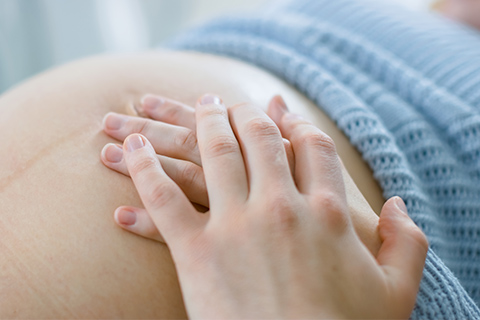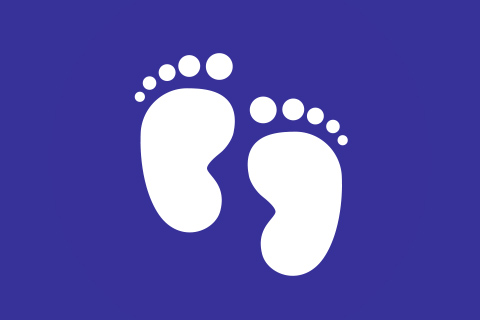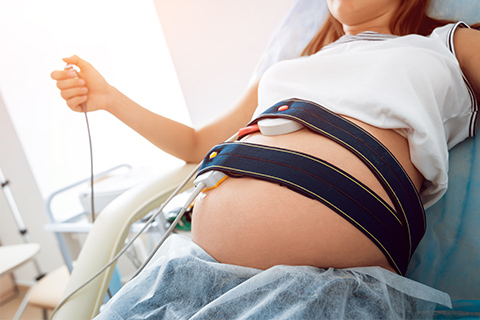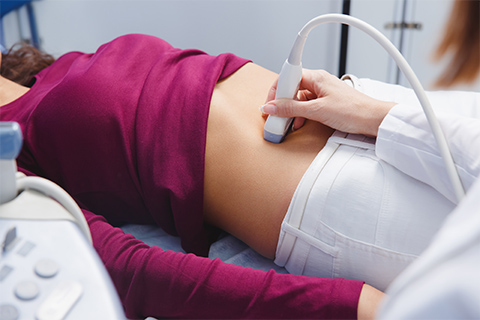Test of Fetal Well Being
Certain conditions in pregnancy can compromise the environment of the unborn child. In the final trimester we often do testing in women in whom a high risk condition has been identified to be sure that their baby is not affected.

Starting at 32 weeks we will ask you to come to our office once or twice weekly for testing. Providing the testing is reassuring we will continue in this manner until you have reached 39 weeks. At some point in your 39th week we will move towards delivery. Occasionally, these high-risk conditions affect the fetus to the point that the intrauterine environment is more risky than delivery. If that is the case you and your doctor will have a conversation about how and when to deliver your baby safely.
Maternal conditions that affect the growing baby and require testing after 32 weeks: Age over 40 at delivery, previous stillbirth, hypertension, diabetes, identical twins, clotting disorders, Lupus, kidney disease.
Conditions in the fetus that require close monitoring: growth restriction, cardiac malformations, decreased fetal movement, low amniotic fluid.
If you have been told that you need to begin testing for fetal wellbeing see below for a description of those tests.
Fetal Kick Counts
A healthy baby moves frequently in your uterus. You can help look out for the health of your baby by recording a count of the number of times your baby kicks, twists, hiccups, or turns. Doing this is called Fetal Kick Counts. We would like all patients to be aware of movement patterns. Before 28 weeks it is normal to feel the baby move 3-4 times a day. The baby is moving more than that, but because the baby is still small you may not feel every movement.

Once you reach 28 weeks we would like you to begin keeping track of the movements. If you feel that you have felt 10-15 movements in the last 24 hours you do not need to take the time to do this. If you have not, follow the procedure outlined below.
How do I do the Fetal Kick Counts?
- Lie on your side and concentrate on the baby’s activity.
- It is best to have something to eat and drink before counting. Some people decide to do this after a meal.
- You should feel at least 4 movements in 30 minutes whenever your baby normally moves the most. Babies go through sleep cycles and tend to be more active at certain times of the day.
- These movement counts should be done on a daily basis until you deliver.
- Remember that the baby will get bigger during the last month of pregnancy and may not roll or kick as strongly as you are used to. Usually this is because the baby is running out of room to move. Each kick or punch you feel is a movement, they are often not the large rolls that you are used to feeling. The baby’s movement frequency does not change with advancing pregnancy but the intensity of the movements does diminish.
- If the baby is not moving and you have done all of the above, call your nurse-midwife or doctor. The phone number to call is: NS (404) 252-1137, E.Cobb (770) 565-2233, J.C. (678) 775-2300. After hours call our answering service at (404) 487-2337.
Non-Stress Test
A non-stress test (NST) is done to monitor the fetal heart rate when the baby moves spontaneously or is stimulated to move. Fetal activity with a rise in fetal heart rate is a good indication of fetal wellbeing.

The test is non-invasive and painless. It is performed once or twice weekly depending on the indication for the test (i.e. maternal high blood pressure, diabetes, multiple gestation, slow fetal growth, 40 plus weeks gestation). Sometimes it is performed on a one-time only basis in the instance of perceived decreased fetal movement.
Prior to the test, it is important that you have eaten something with a moderate to high glucose content (juices, fruits) and carbohydrates (sandwiches, peanut butter crackers, pancakes, french toast, macaroni). Eat 30 minutes prior to your appointment or bring a snack with you. This will hopefully help make the baby awake and active during the testing.
The test is performed in the doctor’s office or occasionally as an out-patient procedure at Northside Hospital. The monitor will be applied by attaching two elastic straps around your abdomen. One device records the fetal heart rate and the other uterine activity. When you feel the baby move, you will push a button which will mark the monitor paper. The test takes 20 – 30 minutes. The test is “reactive” if the fetal heart rate accelerates at least 15 beats per minute above the average rate and does this for 15 seconds twice during the test.
It is best to leave small children at home as you will not be able to move about the room. Sometimes, you will need an ultrasound on the same day depending on the findings of the non-stress test. We cannot predict when that will happen so please allow time in your schedule for that eventuality.
Biophysical Profile
This is a combination of tests which include the non-stress test and an ultrasound to evaluate your baby’s growth and well-being. There are five observations:
- Non-stress test/fetal heart rate
- Amniotic fluid volume
- Fetal movements
- Fetal tone
- Breathing movements of the baby
The testing can be done in the doctor’s office or at Northside Hospital. Be sure to eat one to two hours prior to the test as instructed in the NST information. The testing time is about 45-60 minutes. Results are known as soon as the test is completed.
Let's stay in touch
Our monthly newsletter keeps you up-to-date on healthy lifestyle, latest news, and our practice.




